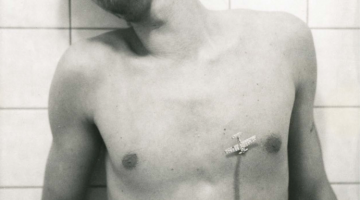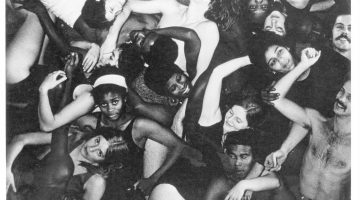“The Worlds of Bernice Bing”
Produced and directed by Madeleine Lim
Co-Producer and Project Director, Jennifer Banta Yoshida
Presented by the Asian American Women Artists Association
and the Queer Women of Color Media Arts Project
De Young Museum, Koret Auditorium
Friday, September 13th at 7:00pm
By John Held, Jr.
Art history is a sloppy affair with some artists garnering attention and others of equal talent lingering in the margins. But things change. Reputations of the once mighty languish, the forgotten rising in unexpected ways by others dredging the past. The true measure of an artist is that they continue in their practice despite neglect, despite the hardships of making a living from a tenuous profession, despite the doubts that creep into their artistic practice. And one day, perhaps too late for them to witness firsthand, their talents are recognized, they inspire others, and impart a legacy that furthers the march of cultural continuation.
Historical recognition in Western Culture can be especially unkind to women, to those of color, and individuals of divergent lifestyles. All of these pertain to the artist Bernice Bing, a Chinese-American lesbian artist, who came of age during the Beat Era and studied under such artistic luminaires as Nathan Oliveira, Saburo Hasegawa, Richard Diebenkorn at the California College of Arts and Crafts and Elmer Bischoff and Frank Lobdell at the California School of Fine Arts, which became the San Francisco Art Institute in 1960. One year later Bing obtained her Masters degree from SFAI in the first year the program was instituted. Her fellow students are a who’s who of the late Beat scene: Manuel Neri, Joan Brown, William T. Wiley, Robert Hudson.
Her path to CCAC and SFAI was circuitous. Born in 1936 to a mother of 18 who died at age 23, Bing was brought up in both Caucasian foster care and that of her grandmother, who eventually abandoned her. But Bing was persistent. While at the Art Institute, she waitressed at the Beat hangout the Spaghetti Factory, over which she had a studio. Right after graduation, she showed at the Dilexi and Batman Galleries. Her shows were reviewed in Artforum. She went to New York for the first time with Joan Brown and met Duchamp at a party. In 1967, she entered a residential program at Esalen with the likes of Joseph Campbell, R. D. Laing and Fritz Perls.
In 1968, Bing served on the National Endowment for the Arts Expansion Program, and this lead to other stints in cultural organizations including the Neighborhood Arts Program (1969-1971), the Comprehensive Employment and Training Act (1972-1976), and was appointed Director of the South of Market Cultural Center (SOMAR) in 1980, serving in that capacity until 1985. These administrative positions took a toll on her painting practice, which she resumed after traveling to China, Korea and Japan, where she studied calligraphy.
Upon her return form Asia, she moved to Philo in Mendocino County. Isolated, supporting herself as a waitress, cook and counselor at a youth rehabilitation center, she gained solace by joining the newly established Asian American Women Artists Association. She passed away in 1998 at age 63 having suffered with Lupus.
Free tickets are available for the de Young Museum September 13 screening in the Koret Auditorim beginning at 6 PM. The program includes commentary by Flo Oy Wong and an introduction by AAWAA Board President Cynthia Tom. After the screening there will be a Q&A with Jennifer Banta Yoshida, Lenore Chinn and Rudy Lemcke, moderated by Mark Dean Johnson, Professor, San Francisco State University. No advance reservations are necessary. Seating begins at 6:30 PM. For more information, call the de Young Museum’s information line at (415) 750-3600.








